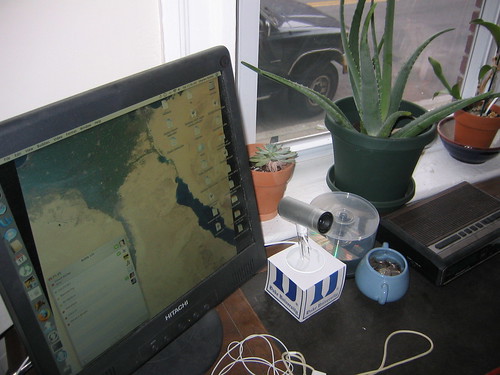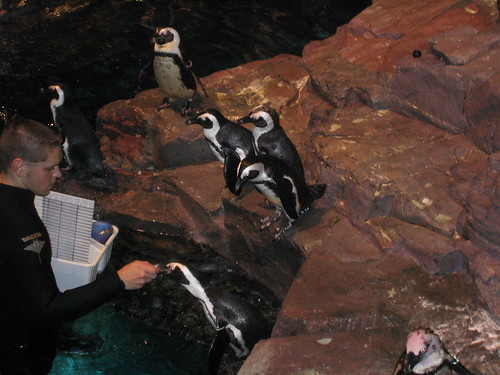My new startup project, Miranda Stories, which I'm really excited to be flying out to Woodside, CA to work full-time on in January now has a blog, so be sure to keep up to date on what we're up to!
"Inspired by Y Combinator, an angel investor that specializes in software start-ups, MIT Sloan School of Management student, Chuck Eesley, rounded up industry giants to became founders in a tiny new company with a big idea.The vision which unites this group is to build innovative English Language Learning software for the new generation of low-cost computers and bring high-quality, engaging educational opportunities to millions in the U.S. and around the globe."
Sunday, October 30, 2005
Saturday, October 29, 2005
PUMPKIN DROP - Sat., Oct. 29th @ 11:59 PM
PUMPKIN DROP - Sat., Oct. 29th @ 11:59 PM: "Come watch as over a dozen pumpkins are dropped from the tallest building in Cambridge!"
SNOW!
Just wanted everyone to know that it's snowing in Boston right now. Those big, wet snowflakes have been coming down for over an hour now . . .
Tuesday, October 25, 2005
More mathematicians
de Moivre was imprisoned for his religious convictions around the age of 20. When he got out of jail, he did what any young guy just out of jail would do - he started studying math! He created the Central Limit Theorem.
In other news, the new Chairman of the Federal Reserve is an MIT econ PhD. Somehow it comforts me that he suffered through the same classes I'm suffering through currently.
In other news, the new Chairman of the Federal Reserve is an MIT econ PhD. Somehow it comforts me that he suffered through the same classes I'm suffering through currently.
Saturday, October 22, 2005
Infrequent Musings
Karim R. Lakhani, one of the phd students in my program defended his dissertation a couple weeks ago. It was a sign to me of how far I have to go yet and also an inspiration for all there is to learn. Of the experience, he says,
"On September 30 2005 I defended (and passed) my doctoral dissertation oral exams. It is such a great feeling to be done with much of the formal parts of my "higher" education. At the same time I have a feeling that this is just the beginning . . . Aga Shahid Ali's wonderfull book of poetry Rooms Are Never Finished provides an apt title to my post and captures my view that scholarship is a journey."
One of the Sloan MBA's (SDM) blogs here.
"On September 30 2005 I defended (and passed) my doctoral dissertation oral exams. It is such a great feeling to be done with much of the formal parts of my "higher" education. At the same time I have a feeling that this is just the beginning . . . Aga Shahid Ali's wonderfull book of poetry Rooms Are Never Finished provides an apt title to my post and captures my view that scholarship is a journey."
One of the Sloan MBA's (SDM) blogs here.
Saturday, October 15, 2005
Tuesday, October 11, 2005
Gosset
The early statisticians/mathematicians were really fascinating people . . .
Many people are familiar with the name "Student"; but not with the name Gosset. In fact Gosset wrote under the name "Student" which explains why his name may be less well known than his important results in statistics. He invented the t-test to handle small samples for quality control in brewing. Gosset discovered the form of the t distribution by a combination of mathematical and empirical work with random numbers, an early application of the Monte-Carlo method.
McMullen says:-
To many in the statistical world "Student" was regarded as a statistical advisor to Guinness's brewery, to others he appeared to be a brewer devoting his spare time to statistics. ... though there is some truth in both these ideas they miss the central point, which was the intimate connection between his statistical research and the practical problems on which he was engaged. ... "Student" did a very large quantity of ordinary routine as well as his statistical work in the brewery, and all that in addition to consultative statistical work and to preparing his various published papers."
Many people are familiar with the name "Student"; but not with the name Gosset. In fact Gosset wrote under the name "Student" which explains why his name may be less well known than his important results in statistics. He invented the t-test to handle small samples for quality control in brewing. Gosset discovered the form of the t distribution by a combination of mathematical and empirical work with random numbers, an early application of the Monte-Carlo method.
McMullen says:-
To many in the statistical world "Student" was regarded as a statistical advisor to Guinness's brewery, to others he appeared to be a brewer devoting his spare time to statistics. ... though there is some truth in both these ideas they miss the central point, which was the intimate connection between his statistical research and the practical problems on which he was engaged. ... "Student" did a very large quantity of ordinary routine as well as his statistical work in the brewery, and all that in addition to consultative statistical work and to preparing his various published papers."
Monday, October 10, 2005
Learning Friends - Quest
The gods at MIT, besides bestowing us with monthly "suicide prevention" holidays, grant us the entire month of January off between terms! So, I'm taking the opportunity to fly out to San Fran, work with Learning Friends, and stay with Ann, in Woodside, CA. I'm really looking forward to it! I booked my flight out for Dec. 30th - Feb. 3rd...
We're currently looking into a possible project to adapt LF's educational software for these MIT prototype laptops.
Learning Friends is an early stage company determined to solve the learning problem of children at home and at school. At this stage, we are raising funds.
Challenge
Approximately one third of the U.S. population is functionally illiterate. In addition, a vast majority of children aren't prepared for the complexity of life in the 21st century. Learning Friends will revolutionize the education process, making it possible for children who use the Learning Friends service to master not only the basics, but "expanded basics," how to learn, adapt and apply their knowledge in a global environment. Learning Friends will offer the solution to the learning problem, both at home and at school.
Mission
Enable children ages 4-9 to master an expanded set of basic skills, including how to learn, adapt and choose in a global environment.
We're currently looking into a possible project to adapt LF's educational software for these MIT prototype laptops.
Learning Friends is an early stage company determined to solve the learning problem of children at home and at school. At this stage, we are raising funds.
Challenge
Approximately one third of the U.S. population is functionally illiterate. In addition, a vast majority of children aren't prepared for the complexity of life in the 21st century. Learning Friends will revolutionize the education process, making it possible for children who use the Learning Friends service to master not only the basics, but "expanded basics," how to learn, adapt and apply their knowledge in a global environment. Learning Friends will offer the solution to the learning problem, both at home and at school.
Mission
Enable children ages 4-9 to master an expanded set of basic skills, including how to learn, adapt and choose in a global environment.
Friday, October 7, 2005
Official: World not ready for flu
"'The world is woefully unprepared,' Mike Leavitt, the U.S. secretary of health and human services, told CNN Thursday. 'You'd think that it would be a matter of constant concern to us. It has not been, anywhere in the world and, consequently, the world is unprepared. And we're now as a civilization rallying to say, 'What can we do to better prepare?''"
Sunday, October 2, 2005
Learning from one or fewer
Potential pieces of theory for my upcoming paper on multiple entrepreneurs . . . and yes, I spend all my time recently reading papers written 20 years ago.
"Near-histories are useful antidotes to a tendency to over generalize from the drama of great disasters or victories (Fischhoff 1982). For example, students of the Battle of Midway have suggested a number of quite likely alternative scenarios for that battle that would have led to notably different outcomes (Prange 1982). Future admirals learn not only from the battle but also from its near-histories. Standardfolkloric observations that great failures often are the consequence of bad luck or timing and great successes the consequence of good luck or timing suggest an implicit distribution of possible outcomes around the observed outliers. They emphasize that the near-histories of genius and foolishness are more similar than their realized histories."
-- from March, Sproull, and Tamuz 1991 - titled "Learning from Samples of One or Fewer", published in Organization Science
"Near-histories are useful antidotes to a tendency to over generalize from the drama of great disasters or victories (Fischhoff 1982). For example, students of the Battle of Midway have suggested a number of quite likely alternative scenarios for that battle that would have led to notably different outcomes (Prange 1982). Future admirals learn not only from the battle but also from its near-histories. Standardfolkloric observations that great failures often are the consequence of bad luck or timing and great successes the consequence of good luck or timing suggest an implicit distribution of possible outcomes around the observed outliers. They emphasize that the near-histories of genius and foolishness are more similar than their realized histories."
-- from March, Sproull, and Tamuz 1991 - titled "Learning from Samples of One or Fewer", published in Organization Science
Subscribe to:
Posts (Atom)



